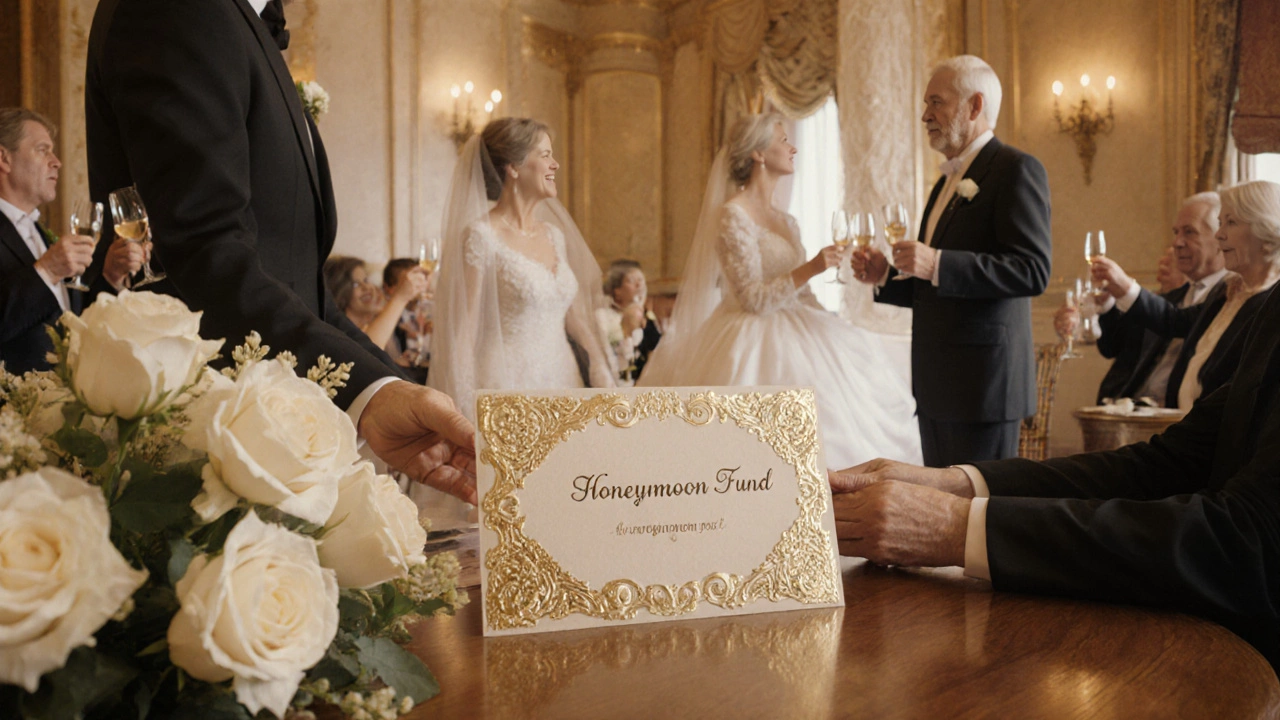Who Pays for the Honeymoon? Common Traditions & Tips
 Oct, 16 2025
Oct, 16 2025
Honeymoon Cost Estimator
Estimate Your Honeymoon Budget
Get a realistic cost estimate based on your destination, travel style, and trip duration.
How This Works
This calculator uses average costs from different destinations. The values represent typical ranges we've seen in the article. Your actual costs may vary based on travel dates, specific locations, and personal preferences.
Pro Tip
Many couples include a honeymoon fund in their wedding registry. Guests can contribute directly to help cover costs while keeping the process transparent and stress-free.
When the big day rolls around, the fun part that most couples look forward to is the honeymoon. But before you start scrolling through tropical resorts, a common question pops up: who actually pays for the honeymoon?
Understanding the typical honeymoon cost helps you decide who should chip in and how to plan the budget without surprises.
In most discussions, Honeymoon is the first vacation a newly married couple takes together, often to celebrate their marriage and enjoy some private time is viewed as a special perk of marriage. Historically, the money came from whoever could afford it, but cultural norms have shaped expectations over time.
Traditional Expectations
For decades, the default assumption was that the Bride’s family footed the bill. This stemmed from the idea that the bride’s side covered wedding‑related expenses, while the Groom’s family handled the reception and other post‑wedding celebrations.
Why? In many cultures, parents view the honeymoon as a continuation of the marriage gift to their daughter. It’s also a way to ensure the couple gets a stress‑free start without worrying about travel costs.
Modern Shifts in Who Pays
Today, couples are redefining these roles. It’s increasingly common for the Bride and Groom themselves to cover the honeymoon, especially when they have established careers.
Joint contributions from both families are also on the rise, turning the payment into a collaborative effort. Some couples even set up a dedicated Wedding Registry that includes travel vouchers, airline miles, or cash gifts earmarked for the honeymoon.
Cultural Variations
Different regions follow distinct customs. Below is a quick snapshot of who typically pays in a few major traditions.
| Region / Culture | Primary Payer(s) | Typical Contribution Size |
|---|---|---|
| North America (US & Canada) | Couple (often both partners) + optional family help | $2,000-$5,000 |
| United Kingdom | Groom’s family (historically) / Couple now | £1,500-£4,000 |
| India (traditional) | Bride’s parents | ₹100,000-₹300,000 |
| India (modern urban) | Couple + parents from both sides | ₹200,000-₹500,000 |
| East Asia (Japan, Korea) | Couple, sometimes parents | ¥250,000-¥800,000 |
| Middle East | Groom’s family (often extensive) | Varies widely, often luxury |
The numbers are averages and can fluctuate based on location, travel style, and personal preferences. The key takeaway? There isn’t a one‑size‑fits‑all rule; the decision hinges on family dynamics, financial capability, and mutual agreement.

Budgeting Tips for Couples
Regardless of who pays, setting a realistic budget is vital. Start by listing the core components: flights, accommodation, meals, activities, and travel insurance. Use a simple spreadsheet or a budgeting app to track expected versus actual costs.
Consider negotiating with a Travel Agency early in the planning stage. Many agencies offer discounted packages for newlyweds, especially when you book a “honeymoon bundle.”
Don’t forget hidden fees like airport transfers, visa charges, and gratuities. Adding a 10‑15% contingency buffer can save you from unpleasant surprises once you’re on the beach.
Who Can Contribute Beyond the Immediate Family?
Beyond parents, other relatives and friends often want to help. Here are common ways they chip in:
- Cash gifts - Direct contributions via a honeymoon fund.
- Travel vouchers - Airline or hotel gift cards.
- Experience gifts - Paid excursions, spa treatments, or dinner reservations.
- Group contributions - Siblings pooling money to cover a specific expense.
If you’ve set up a Wedding Registry that includes a “honeymoon fund” option, guests can easily add their portion during the gifting process. This approach keeps everything transparent and avoids awkward conversations about money.

Talk the Talk: How to Discuss Money Gracefully
Money can be a sensitive topic, but clear communication prevents resentment. Hold a relaxed “budget sit‑down” with both families early in the planning timeline. Outline the estimated honeymoon cost (you’ve already used the strong tag once, so keep it plain here) and ask for any contributions they feel comfortable making.
Make it clear that any amount, big or small, is appreciated. Emphasize the experience over the price tag; a modest weekend getaway can be just as memorable as an exotic island escape.
Final Checklist Before You Book
- Confirm who is paying which parts of the trip.
- Set a total budget and add a 10% contingency.
- Secure travel insurance that covers cancellations and medical emergencies.
- Book flights and accommodation at least 3‑4 months in advance for best rates.
- Communicate the plan with all contributors to avoid double‑paying.
Following this checklist lets you focus on the romance rather than the receipt.
Frequently Asked Questions
Do parents always have to pay for the honeymoon?
No. While many traditions expect parents to cover the cost, modern couples often split the expense themselves or ask for contributions from both sides.
What’s a realistic budget for a U.S. honeymoon?
For a moderate trip, budgeting between $2,000 and $5,000 works for most couples. This covers flights, a mid‑range hotel, meals, and a few activities.
Can I add a honeymoon fund to my wedding registry?
Yes. Many registry platforms let you create a cash‑gift option labeled “Honeymoon Fund,” letting guests contribute directly.
How do cultural traditions affect who pays?
Different regions have distinct norms - for example, in traditional Indian families the bride’s parents usually cover it, while in many Western couples the newlyweds split the cost themselves.
Should we include travel insurance in the honeymoon budget?
Absolutely. Travel insurance protects against flight cancellations, medical emergencies, and other unexpected events, and it’s a small price for peace of mind.